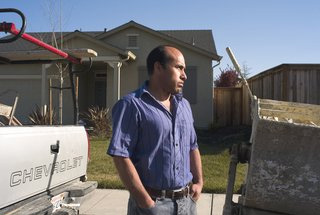
|
 |
 |
 Business News | March 2008 Business News | March 2008  
Construction Skid Sidelines Latino Immigrant Workers
 Susan Ferriss - Sacramento Bee Susan Ferriss - Sacramento Bee
go to original


| | Jose Espinosa can't find work in the construction industry and is saddled with a $2,700-a-month mortgage payment for the Stockton home he and his wife, Maria, and son, Erick, live in. Espinosa had been working steadily as a stucco and walls craftsman. (Paul Kitagaki Jr./Sacramento Bee) | | |
Jose Espinosa worked his way out of the strawberry fields of Central California in the early 1990s, determined to learn a profitable trade.

He did, and as a craftsman in stucco and walls, he enjoyed 12 straight years of handsomely rewarded construction work.

Six months ago he was laid off and now may lose the house he and his wife bought a couple of years ago in Stockton. They had saved $30,000 for a down payment.

"That was my life savings," said the 38-year-old legal Mexican immigrant.

Latino immigrants like Espinosa, legal and illegal, were the backbone of California's housing boom, and they are feeling the pain of what Espinosa calls "una recesion."

As housing and the economy in general cools, other less lucrative jobs also are in shorter supply, upping competition for low-paying work in factories, restaurants and other services – even for jobs in the fields.

These days in Sacramento, many of the immigrants who gather outside a gas station on Martin Luther King Boulevard – hoping for a day labor job – say they once had steady, good-paying construction work.

Salvadoran Jose Dominquez, an undocumented worker for a dozen years, said he made good money in construction.

Now he picks up only occasional jobs digging ditches, putting down pipes.

"They want us to do the tough work. They give us a jackhammer and we bust up the concrete," he said. "They pay us $10 an hour."

"Thank God my brother still has regular construction work with his boss," he said. "He's the one paying the bills now."

State employment data show a dramatic slide in construction jobs: A preliminary estimate of California's construction work force as of February of this year was 834,500, compared with 913,000 in February 2007.

About a quarter of the nation's construction workers are Latinos, according to the Pew Hispanic Center, a research institute in Washington, D.C.

Pew also estimates that between 21 percent and 25 percent of U.S. construction laborers, stone and brick masons and concrete finishers in 2005 were undocumented. In California, where entire crews who built houses were often Latino, the concentration of legal and illegal Latino immigrant workers is believed to be far greater.

Jose Garcia, an illegal immigrant from Mexico, poured concrete driveways and foundations for a Sacramento contractor for five years. After that, he got a job with another contractor he said still owes him $1,570.

Garcia said he has two children in Mexico whom he supports, but he hasn't been able to send money recently.

University of California at Los Angeles economist Jerry Nickelsburg said the amount of money – or remittances – that immigrants send home is decreasing.

The volume of remittances to Mexico rose steadily for years, fueled in no small part by construction, Nickelsburg said. But remittances dropped sharply in January year to $1.6 billion, down from $2 billion in June.

Nickelsburg said it's hard to measure the true scope of job losses with the downturn since undocumented workers who work off the books are "outside our statistics." Even if they worked under Social Security numbers, he said, they don't typically claim unemployment benefits out of fear.

In Stockton, Espinosa and his wife, Maria, 38, say they are scared. They have a 6-year-old, and Maria – who usually works in the fields – is pregnant with twins and can't work this season.

Espinosa said he'll return to the fields if he has to but he won't earn enough to save the house he wanted to raise his kids in.

His mortgage is $2,700 a month, he said. When he bought the house, he was earning at least $1,000 a week building houses in the Central Valley, Sacramento and the Sierra foothills.

It was enough to make him feel secure.

"Everybody said it was a good idea to buy a house. So we got excited and did it," Espinosa said. "My problem now is not a subprime loan. My problem is there is no work."

sferriss(at)sacbee.co | 
 | |
 |



